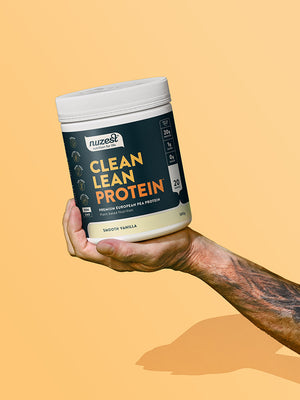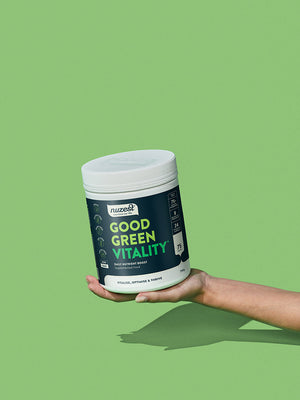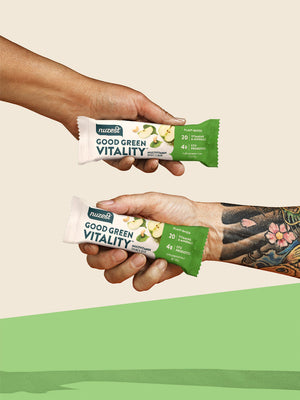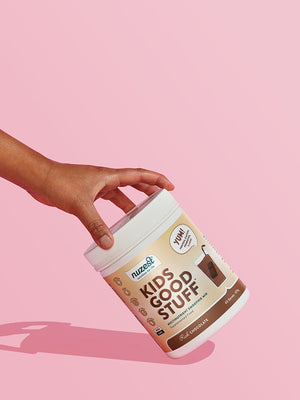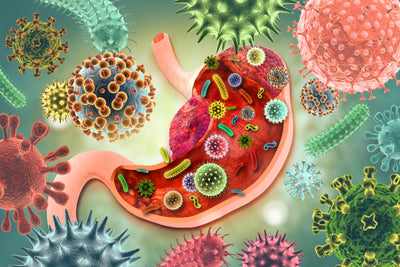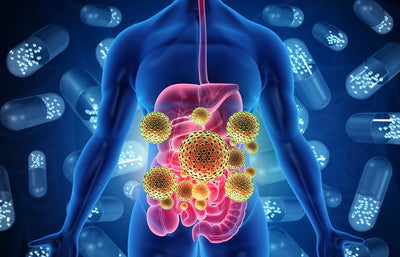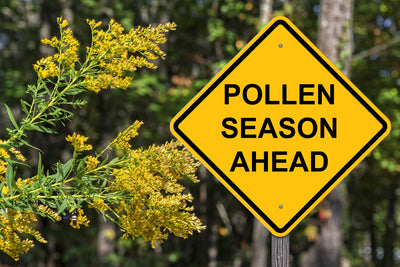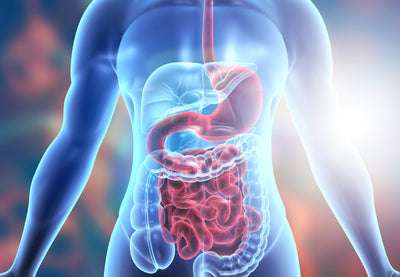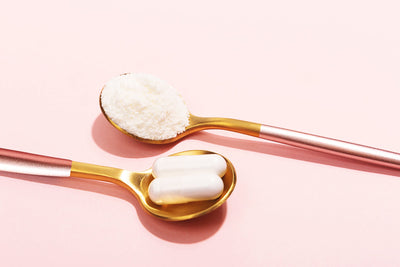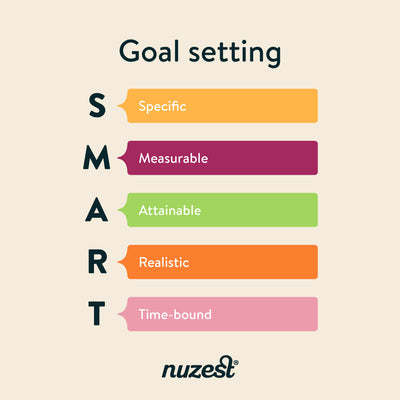
14 min read
Do Kids Need Multi Vitamins?
Posted By
Karim Youssef

Cliff Harvey PhD
Live healthier and happier, perform at your best, and achieve a life of passion and purpose. Cliff Harvey is a proven leader in the field of health and performance and his coaching, books, and talks will help you to take your health and performance to the next level.

The simple answer to this question is no. Much like adults, kids do not need to take a multivitamin. As a species, humans survived for hundreds of thousands of years without supplements and we can get all that we need from food, given the right food, lifestyle and environment. However, there can be compelling reasons to consider a supplement to help support optimal growth and performance.
Want a FREE Kids Good Stuff Sample - Click Here
Do we get what we need from diet alone?
As adults, many of us don’t get all the essential micronutrients that we need to thrive from diet alone. This is especially true of vitamin A, B1, B6, B12, iron, magnesium, zinc and selenium1,2. Without all of these vital nutrients, we are unable to perform well or have robust good health and this is true for kids too!
Insufficient intakes of nutrients rise rapidly from infancy. From the age of two to four and 14-18, around one third of males and over one quarter of females do not consume sufficient vitamin A. Around one in 10 young women don’t have sufficient vitamin B1 and folate; one in 20 sufficient B12, and one in five sufficient B6. Inadequacy of essential minerals is even more pronounced, with around 80% consuming inadequate amounts of calcium by the age of 18 and over 60% consuming inadequate amounts of magnesium. Iodine, iron, and phosphorus intakes are also particularly concerning in young women, while for boys zinc is reported to be the mineral of concern, with rates of zinc insufficiency rising from almost none at two to four years to over two thirds by older adulthood2.
Why don’t we always get what we need from the diet?
We eat more processed food
The major reason for not getting all we need from diet alone is simple; we eat more refined and processed foods. In Australia, around one third or more of our daily energy intake comes from ‘discretionary foods’. Discretionary foods and drinks are “not necessary to provide the nutrients the body needs”. They are rich in energy (calories) and low in the essential and secondary nutrients that are beneficial to overall health2.
Research also indicates that overtime we are eating fewer nutrient-rich whole foods. In fact, it is reported that less than half of us eat the recommended amounts of vegetables and fruit that we should to optimise health3. There have also been changes noted in our snacking behaviours, with snacking (identified as food consumed outside of meal times) contributing to 35% of total energy intake for over 95% of Australian children (aged 2-6 years). You can learn more about changes in child snacking behaviours and the resulting health impact in this article.
Some foods may be lower in essential nutrients than in the past
US Department of Agriculture data shows that some fresh produce (some vegetables, fruits, and berries) may only provide around half the amounts of some vitamins and minerals that they did in the 1950s4. So, while we have been eating more over time, and taking in more than enough calories and ‘fuel’, we aren’t necessarily getting enough of the ‘little guys’ - the vitamins, minerals and secondary nutrients that help every system of the body run optimally.
There are additional reasons as to why our diets are becoming more insufficient:
- Increasingly stressful lifestyles which increase our demand for micronutrients.
- A longer ‘food chain’ (i.e. more time in transport and storage and less local, fresh produce) which can reduce the amounts of nutrients (especially fragile, water-soluble vitamins)
- Lack of variety in food choices and fewer people choosing wild foods (like previously popular vegetable choices such as dandelion, sow thistle etc.)
How can a multivitamin help kids?
A multivitamin is never a substitute for healthy eating, and the focus should always be on working towards a diet mostly based on natural, unrefined foods. Multivitamins however, can help to ‘fill the gaps’ in nutrition and are considered a safe and effective way to ensure a healthy intake of essential and beneficial nutrients5. In a study of school-age children, memory test scores were improved in children taking a multivitamin6.
Additionally, supplementation to ensure the adequacy of various nutrients including vitamins B, C, D, and zinc and magnesium might help to:
- Improve migraines7,8
- Improve growth rates, muscle and blood markers of later health risks9-13
- Improve behaviour and cognition14-16
- Reduce respiratory problems17-20
Ensuring nutrient density
The shift towards more sugar and ‘ultra-refined’ processed foods has been detrimental to kids’ health, and our key focus should be on encouraging the receptive minds of young people to become reconnected to the REAL food that their growing bodies and active minds need.
- Try to make at least 80% of what you put in your child's lunchbox (or on their plate) natural, whole, unprocessed food. Check out our article ‘How to Pack a Healthy Lunchbox’ for healthy meal and snack ideas.
- Choose natural, unrefined carbohydrate choices (such as sweet potato, yams, potato and some whole, unprocessed grains) over pasta, bread, crackers and other refined choices.
- Choose water over fruit juices, cordials and soft drink.
- Get kids eating vegetables early! Much of our food preferences are based on what we ‘learn’ to eat early in life. Kids love to copy what adults do as they like to feel like they have ‘grown up’ responsibility. Get kids involved in the kitchen by getting them to pick the vegetables they would like on their dinner plate or in their lunch box. This will increase the likelihood that they will eat their vegetables whilst teaching them how to make healthier food choices.
- Use smoothies made with whole, unprocessed foods (such as vegetables, berries, nuts and nut butter, seeds and fruit) as an option in addition to meals to boost vegetable intake. Try this delicious Wild Strawberry Breakfast Smoothie recipe!
- Consider a whole food-based multi-nutrient supplement such as Nuzest Kids Good Stuff. Packed full of protein, vitamins and minerals, it has all the elements to set your child up for a good day!
Want a FREE Kids Good Stuff Sample - Click Here
References
- University of Otago and Ministry of Health. A Focus on Nutrition: Key findings of the 2008/09 New Zealand Adult Nutrition Survey. Wellington; 2011.
- ABS. Australian Health Survey: Nutrition First Results‐Foods and Nutrients, 2011‐12. Australian Bureau of Statistics Canberra; 2014.
- Annual Update of Key Results 2014/15. Wellington: New Zealand Ministry of Health. ; 2015.
- Davis DR, Epp MD, Riordan HD. Changes in USDA Food Composition Data for 43 Garden Crops, 1950 to 1999. Journal of the American College of Nutrition. 2004;23(6):669-82.
- Biesalski HK, Tinz J. Multivitamin/mineral supplements: rationale and safety – A systematic review. Nutrition.
- Vinod Kumar M, Rajagopalan S. Trial using multiple micronutrient food supplement and its effect on cognition. The Indian Journal of Pediatrics. 2008;75(7):671-8.
- Arora J, Jeon M, Marvasti Y, Holz E, Yuvaraj S, Morris L, et al. 133 the effectiveness of riboflavin (vitamin b2) in preventing migraine episodes in the paediatric population: a comprehensive review. Journal of Investigative Medicine. 2018;66(1):A121.
- Kelishadi R, Farajzadegan Z, Bahreynian M. Association between vitamin D status and lipid profile in children and adolescents: a systematic review and meta-analysis. International journal of food sciences and nutrition. 2014;65(4):404-10.
- Galescu OA, Crocker MK, Altschul AM, Marwitz SE, Brady SM, Yanovski JA. A pilot study of the effects of niacin administration on free fatty acid and growth hormone concentrations in children with obesity. Pediatric Obesity. 2018;13(1):30-7.
- Colletti RB, Roff NK, Neufeld EJ, Baker AL, Newburger JW, McAuliffe TL. Niacin Treatment of Hypercholesterolemia in Children. Pediatrics. 1993;92(1):78-82.
- Filgueiras MS, Rocha NP, Novaes JF, Bressan J. Vitamin D status, oxidative stress, and inflammation in children and adolescents: A systematic review. Critical Reviews in Food Science and Nutrition. 2018:1-10.
- Gunanti IR, Al-Mamun A, Schubert L, Long KZ. The effect of zinc supplementation on body composition and hormone levels related to adiposity among children: a systematic review. Public Health Nutrition. 2016;19(16):2924-39.
- Pimpin L, Liu E, Shulkin M, Duggan C, Fawzi W, Mozaffarian D. The Effect of Zinc Supplementation during Pregnancy and Youth on Child Growth up to 5 Years: A Systematic Review and Meta-Analysis. The FASEB Journal. 2016;30(1_supplement):671.7-.7.
- Mousain-Bosc M, Roche M, Polge A, Pradal-Prat D, Rapin J, Bali JP. Improvement of neurobehavioral disorders in children supplemented with magnesium-vitamin B6. I. Attention deficit hyperactivity disorders. Magnes Res. 2006;19(1):46-52.
- Huang Y-H, Zeng B-Y, Li D-J, Cheng Y-S, Chen T-Y, Liang H-Y, et al. Significantly lower serum and hair magnesium levels in children with attention deficit hyperactivity disorder than controls: A systematic review and meta-analysis. Progress in Neuro-Psychopharmacology and Biological Psychiatry. 2019;90:134-41.
- Warthon-Medina M, Moran VH, Stammers AL, Dillon S, Qualter P, Nissensohn M, et al. Zinc intake, status and indices of cognitive function in adults and children: a systematic review and meta-analysis. European Journal of Clinical Nutrition. 2015;69(6):649-61.
- Heydarian F, Ahanchian H, Khalesi M, Ebrahimi S. The effect of serum levels of vitamin C on asthmatic children: a systematic review. Reviews in Clinical Medicine. 2016;3(3):87-92.
- Jat KR. Vitamin D deficiency and lower respiratory tract infections in children: a systematic review and meta-analysis of observational studies. Tropical Doctor. 2016;47(1):77-84.
- Rajabbik MH, Lotfi T, Alkhaled L, Fares M, El-Hajj Fuleihan G, Mroueh S, et al. Association between low vitamin D levels and the diagnosis of asthma in children: a systematic review of cohort studies. Allergy, Asthma & Clinical Immunology. 2014;10(1):31.
- Fares MM, Alkhaled LH, Mroueh SM, Akl EA. Vitamin D supplementation in children with asthma: a systematic review and meta-analysis. BMC Research Notes. 2015;8(1):23. Disclaimer: The information provided on Nuzest is for educational and informational purposes only. The information provided on this site is not, nor is it intended to be, a substitute for professional advice or care. Please speak to your qualified healthcare professional in the event that something you have read here raises questions or concerns regarding your health.
Disclaimer: The information provided on Nuzest is for educational and informational purposes only. The information provided on this site is not, nor is it intended to be, a substitute for professional advice or care. Please speak to your qualified healthcare professional in the event that something you have read here raises questions or concerns regarding your health.
Related news
min read
An Introduction to Gut Health & Nutrition – 5 Must See Articles
Gut health significantly affects overall wellbeing, influencing brain function, immunity, and metabolism. A balanced gut microbiota, influenced by diet and environment, can potentially enhance health, aid digestion, and reduce allergies. The roles of probiotics and prebiotics in gut health are also discussed.
min read
Probiotics vs. Prebiotics
Unleash gut health with probiotics and prebiotics! Strengthen digestion, immunity, and overall well-being. Try Nuzest's Good Green Vitality for convenient support with 8 billion CFU of probiotics. Take charge now!
min read
The Link Between Gut Health & Allergies - Plus 5 Top Tips to Help
Discover the link between gut health and allergies, and how the gut microbiome influences the body's immune response to allergens. Learn how adopting a balanced diet with prebiotics and probiotics can support gut health, reducing the risk of allergic reactions. Explore solutions for allergy relief and fostering a healthier gut with Nuzest’s multi-nutrient formula, Good Green Vitality.
min read
The Great Diet Debate: Unravelling the Tapestry of Popular Eating Plans
Exploring popular diets such as the Mediterranean, Ketogenic, Plant-Based, Paleo, and Intermittent Fasting, this overview highlights their principles, benefits, and considerations. It emphasizes the importance of finding a dietary pattern that aligns with individual health goals and preferences, while suggesting the potential benefits of incorporating a multi-nutrient supplement for overall health.
min read
The Gut Connection: How to Improve Your Digestion and Gut Health in 6 Steps
Discover the significance of gut health and its impact on digestion and overall well-being in this insightful article. Learn six practical steps, including maintaining a balanced diet, staying hydrated, managing stress, and using antibiotics wisely, to promote a healthy gut and enhance vitality.
min read
Does Gut Health Affect Your Immune System? | Do These 6 Things
The gut microbiome, which consists of trillions of bacteria in our digestive tract, plays a crucial role in supporting our immune system and overall health. Consuming probiotics and prebiotics, staying hydrated, managing stress, limiting processed foods, and engaging in outdoor activity and exercise are effective strategies to promote a healthy gut and enhance immunity.
min read
What is Collagen? Types, Sources and Benefits of Supplementation
Collagen is essential for joints, bones, muscles, ligaments, tendons, cartilage, skin, hair and nails.2 It is one of the primary structural proteins of connective tissue and plays a crucial role in the body by cushioning, strengthening, hydrating, binding, and connecting tissues together.3 Connective tissues are able to provide physical and mechanical support through the collagen, elastic and reticular fibres
min read
Kids Good Stuff for Skin Health
How can you ensure your kids have healthy skin? A part from the obvious, what nutrients can we provide our kids to ensure their skin stays in tip top shape?
min read
Maximising Mood In Your Kids
Almost 1 in 7 children and adults aged 4-17 had been diagnosed with a mental health disorder. Amy Butler discusses good nutrition and lifestyle modifications, that can help to reduce the risk.
min read
Long-Lasting Energy For Kids
Children and adolescents are going through massive periods of growth and development. To keep up with the demands of school, extracurricular activities, sports and friendships, kids often need a bit of an energy boost. In our latest blog we break down some specific nutrients for energy, to help support growing kids, and the best places to source them from.
min read
Setting Health Goals & Staying Motivated in 2021
Use this tried and tested goal strategy to set smaller, specific goals to avoid the overwhelm of unrealistic and vague health objectives.







